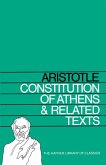46,95 €
46,95 €
inkl. MwSt.
Sofort per Download lieferbar

23 °P sammeln
46,95 €
Als Download kaufen

46,95 €
inkl. MwSt.
Sofort per Download lieferbar

23 °P sammeln
Jetzt verschenken
Alle Infos zum eBook verschenken
46,95 €
inkl. MwSt.
Sofort per Download lieferbar
Alle Infos zum eBook verschenken

23 °P sammeln
- Format: ePub
- Merkliste
- Auf die Merkliste
- Bewerten Bewerten
- Teilen
- Produkt teilen
- Produkterinnerung
- Produkterinnerung

Bitte loggen Sie sich zunächst in Ihr Kundenkonto ein oder registrieren Sie sich bei
bücher.de, um das eBook-Abo tolino select nutzen zu können.
Hier können Sie sich einloggen
Hier können Sie sich einloggen
Sie sind bereits eingeloggt. Klicken Sie auf 2. tolino select Abo, um fortzufahren.

Bitte loggen Sie sich zunächst in Ihr Kundenkonto ein oder registrieren Sie sich bei bücher.de, um das eBook-Abo tolino select nutzen zu können.
As an essential companion to Plato's Apology and Crito, Socrates Against Athens provides valuable historical and cultural context to our understanding of the trial.
- Geräte: eReader
- mit Kopierschutz
- eBook Hilfe
- Größe: 0.38MB
Andere Kunden interessierten sich auch für
![The Genesis of Plato's Thought (eBook, ePUB) The Genesis of Plato's Thought (eBook, ePUB)]() The Genesis of Plato's Thought (eBook, ePUB)46,95 €
The Genesis of Plato's Thought (eBook, ePUB)46,95 €![The Philosophy of Epicurus (eBook, ePUB) The Philosophy of Epicurus (eBook, ePUB)]() EpicurusThe Philosophy of Epicurus (eBook, ePUB)5,99 €
EpicurusThe Philosophy of Epicurus (eBook, ePUB)5,99 €![Democracy (eBook, ePUB) Democracy (eBook, ePUB)]() Ross HarrisonDemocracy (eBook, ePUB)40,95 €
Ross HarrisonDemocracy (eBook, ePUB)40,95 €![Constitution of Athens and Related Texts (eBook, ePUB) Constitution of Athens and Related Texts (eBook, ePUB)]() AristotleConstitution of Athens and Related Texts (eBook, ePUB)12,85 €
AristotleConstitution of Athens and Related Texts (eBook, ePUB)12,85 €![Calling Philosophers Names (eBook, ePUB) Calling Philosophers Names (eBook, ePUB)]() Christopher MooreCalling Philosophers Names (eBook, ePUB)26,95 €
Christopher MooreCalling Philosophers Names (eBook, ePUB)26,95 €![The Idea of the Soul (eBook, ePUB) The Idea of the Soul (eBook, ePUB)]() William EllisThe Idea of the Soul (eBook, ePUB)54,95 €
William EllisThe Idea of the Soul (eBook, ePUB)54,95 €![Apollonius of Tyana (eBook, ePUB) Apollonius of Tyana (eBook, ePUB)]() George Robert Stowe MeadApollonius of Tyana (eBook, ePUB)1,97 €
George Robert Stowe MeadApollonius of Tyana (eBook, ePUB)1,97 €-
-
-
As an essential companion to Plato's Apology and Crito,Socrates Against Athens provides valuable historical and cultural context to our understanding of the trial.
Dieser Download kann aus rechtlichen Gründen nur mit Rechnungsadresse in A, B, BG, CY, CZ, D, DK, EW, E, FIN, F, GR, HR, H, IRL, I, LT, L, LR, M, NL, PL, P, R, S, SLO, SK ausgeliefert werden.
Produktdetails
- Produktdetails
- Verlag: Taylor & Francis eBooks
- Seitenzahl: 278
- Erscheinungstermin: 15. April 2013
- Englisch
- ISBN-13: 9781135024932
- Artikelnr.: 39264011
- Verlag: Taylor & Francis eBooks
- Seitenzahl: 278
- Erscheinungstermin: 15. April 2013
- Englisch
- ISBN-13: 9781135024932
- Artikelnr.: 39264011
- Herstellerkennzeichnung Die Herstellerinformationen sind derzeit nicht verfügbar.
James A. Colaiaco is a Master Teacher in the General Studies Program of the New York University School of Continuing and Professional Studies. He is the author of Martin Luther King, Jr.: Apostle of Militant Nonviolence (1993) and James Fitzjames Stephen and the Crisis ofVictorian Thought (1983).
1. Introduction: A Tragic Confrontation
2. Setting the Stage for the Trial
Preliminaries
Historicity of the Apology
3. Socrates and Rhetoric
Athens-City of Speech
Socrates' Opening Remarks: Dismantling Forensic Rhetoric
4. Socrates Confronts His Old Accusers
Socrates and Aristophanes' Clouds
Socrates Denies He is a Teacher of Natural Science
Socrates Denies He is a Sophist
5. Socrates' Radical Philosophic Mission
The Delphic Oracle
Socrates Examines the Politicians, Poets, and Craftsmen
The Mask of Ignorance
Solving the Riddle of the Oracle
6. The Athenian Polis Ideal
The Funeral Oration of Pericles: Apotheosis of the Polis
Homeric Shame Culture
Democracy Appropriates Homer
The Polis and the Individual
7. Socrates Confronts His Present Accusers: The Interrogation of Meletus
Corrupting the Young
The Polis as Teacher
Athenian Polis Religion
Socrates and Impiety
8. Socrates Brings the Philosophic Mission into the Court
Death Bears No Sting
Caring for One's Soul
Stepping Up the Offense
The Gadfly
9. The Politics of an Unpolitical Man
A Private Rather than a Public Station
Socrates' Divine Voice
Defender of Justice
10. The Trial Concludes: Socrates Condemned
The Corruption Charge Revisited
Rejecting an Appeal for Sympathy
Proposing a Counterpenalty
Truth Fails to Persuade
Parting Words to Enemies
Parting Words to Friends
11. Socrates and Civil Disobedience: The Crito
Socrates and Antigone
Socrates Dismisses the Shame Culture
Justice and the Soul
Socrates Argues for the Laws
The Skillful Ironist
Fulfilling the Will of a Benevolent God
12. Conclusion: A Conflict Unresolved
Notes
Selected Bibliography
Index
2. Setting the Stage for the Trial
Preliminaries
Historicity of the Apology
3. Socrates and Rhetoric
Athens-City of Speech
Socrates' Opening Remarks: Dismantling Forensic Rhetoric
4. Socrates Confronts His Old Accusers
Socrates and Aristophanes' Clouds
Socrates Denies He is a Teacher of Natural Science
Socrates Denies He is a Sophist
5. Socrates' Radical Philosophic Mission
The Delphic Oracle
Socrates Examines the Politicians, Poets, and Craftsmen
The Mask of Ignorance
Solving the Riddle of the Oracle
6. The Athenian Polis Ideal
The Funeral Oration of Pericles: Apotheosis of the Polis
Homeric Shame Culture
Democracy Appropriates Homer
The Polis and the Individual
7. Socrates Confronts His Present Accusers: The Interrogation of Meletus
Corrupting the Young
The Polis as Teacher
Athenian Polis Religion
Socrates and Impiety
8. Socrates Brings the Philosophic Mission into the Court
Death Bears No Sting
Caring for One's Soul
Stepping Up the Offense
The Gadfly
9. The Politics of an Unpolitical Man
A Private Rather than a Public Station
Socrates' Divine Voice
Defender of Justice
10. The Trial Concludes: Socrates Condemned
The Corruption Charge Revisited
Rejecting an Appeal for Sympathy
Proposing a Counterpenalty
Truth Fails to Persuade
Parting Words to Enemies
Parting Words to Friends
11. Socrates and Civil Disobedience: The Crito
Socrates and Antigone
Socrates Dismisses the Shame Culture
Justice and the Soul
Socrates Argues for the Laws
The Skillful Ironist
Fulfilling the Will of a Benevolent God
12. Conclusion: A Conflict Unresolved
Notes
Selected Bibliography
Index
1. Introduction: A Tragic Confrontation
2. Setting the Stage for the Trial
Preliminaries
Historicity of the Apology
3. Socrates and Rhetoric
Athens-City of Speech
Socrates' Opening Remarks: Dismantling Forensic Rhetoric
4. Socrates Confronts His Old Accusers
Socrates and Aristophanes' Clouds
Socrates Denies He is a Teacher of Natural Science
Socrates Denies He is a Sophist
5. Socrates' Radical Philosophic Mission
The Delphic Oracle
Socrates Examines the Politicians, Poets, and Craftsmen
The Mask of Ignorance
Solving the Riddle of the Oracle
6. The Athenian Polis Ideal
The Funeral Oration of Pericles: Apotheosis of the Polis
Homeric Shame Culture
Democracy Appropriates Homer
The Polis and the Individual
7. Socrates Confronts His Present Accusers: The Interrogation of Meletus
Corrupting the Young
The Polis as Teacher
Athenian Polis Religion
Socrates and Impiety
8. Socrates Brings the Philosophic Mission into the Court
Death Bears No Sting
Caring for One's Soul
Stepping Up the Offense
The Gadfly
9. The Politics of an Unpolitical Man
A Private Rather than a Public Station
Socrates' Divine Voice
Defender of Justice
10. The Trial Concludes: Socrates Condemned
The Corruption Charge Revisited
Rejecting an Appeal for Sympathy
Proposing a Counterpenalty
Truth Fails to Persuade
Parting Words to Enemies
Parting Words to Friends
11. Socrates and Civil Disobedience: The Crito
Socrates and Antigone
Socrates Dismisses the Shame Culture
Justice and the Soul
Socrates Argues for the Laws
The Skillful Ironist
Fulfilling the Will of a Benevolent God
12. Conclusion: A Conflict Unresolved
Notes
Selected Bibliography
Index
2. Setting the Stage for the Trial
Preliminaries
Historicity of the Apology
3. Socrates and Rhetoric
Athens-City of Speech
Socrates' Opening Remarks: Dismantling Forensic Rhetoric
4. Socrates Confronts His Old Accusers
Socrates and Aristophanes' Clouds
Socrates Denies He is a Teacher of Natural Science
Socrates Denies He is a Sophist
5. Socrates' Radical Philosophic Mission
The Delphic Oracle
Socrates Examines the Politicians, Poets, and Craftsmen
The Mask of Ignorance
Solving the Riddle of the Oracle
6. The Athenian Polis Ideal
The Funeral Oration of Pericles: Apotheosis of the Polis
Homeric Shame Culture
Democracy Appropriates Homer
The Polis and the Individual
7. Socrates Confronts His Present Accusers: The Interrogation of Meletus
Corrupting the Young
The Polis as Teacher
Athenian Polis Religion
Socrates and Impiety
8. Socrates Brings the Philosophic Mission into the Court
Death Bears No Sting
Caring for One's Soul
Stepping Up the Offense
The Gadfly
9. The Politics of an Unpolitical Man
A Private Rather than a Public Station
Socrates' Divine Voice
Defender of Justice
10. The Trial Concludes: Socrates Condemned
The Corruption Charge Revisited
Rejecting an Appeal for Sympathy
Proposing a Counterpenalty
Truth Fails to Persuade
Parting Words to Enemies
Parting Words to Friends
11. Socrates and Civil Disobedience: The Crito
Socrates and Antigone
Socrates Dismisses the Shame Culture
Justice and the Soul
Socrates Argues for the Laws
The Skillful Ironist
Fulfilling the Will of a Benevolent God
12. Conclusion: A Conflict Unresolved
Notes
Selected Bibliography
Index







